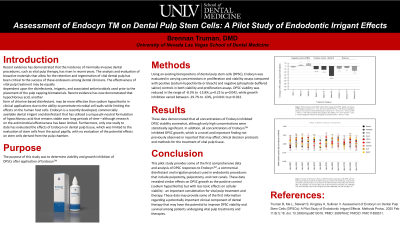Pulp Therapy
223 - Assessment of EndocynTM on Dental pulp stem cells

- BT
Brennan R. Truman, DMD
Resident
UNLV Advanced Education in Pediatric Dentistry
UNLV Pediatric Dental
Las Vegas, Nevada, United States - KK
Karl Kingsley, MPH, PhD, BBA, BA
Professor of Biomedical Sciences
University of Nevada Las Vegas
Las Vegas, Nevada, United States - LR
Lee R. Roundy, Program Director, Pediatric Dentist
UNLV SDM Pediatric dental residency
Las Vegas, Nevada, United States
Presenting Author(s)
Co-Author(s)
Program Director(s)
Title:
Assessment of EndocynTM on Dental Pulp Stem Cells (DPSCs)
Authors:
Brennan Truman, Linda Ma, Samuel Stewart, Karl Kingsley, Victoria Sullivan
Affiliation:
UNLV School of Dental Medicine
Purpose:
To determine viability and growth inhibition of DPSCs after application of EndocynTM
Methods:
Using an existing biorepository of DPSCs, Endocyn was evaluated in varying concentrations in proliferation and viability assays compared with positive (sodium hypochlorite) and negative (phosphate-buffered saline) controls. DPSC viability was reduced in the range of -8.3% to -15.8%, p=0.22 to p=0.042, while growth inhibition varied between -29.7% to -63%, p=0.041 to p=0.022.
Results:
These data demonstrated that all concentrations of Endocyn inhibited DPSC viability somewhat, although only high concentrations were statistically significant. In addition, all concentrations of EndocynTM inhibited DPSC growth, which is a novel finding not previously observed or reported that may affect clinical decision protocols for the treatment of vital pulp tissue.
Conclusion:
This pilot study provides some of the first comprehensive data and analysis of DPSC responses to EndocynTM, a commercial disinfectant and irrigation product used in endodontic procedures that include pulpotomy, pulpectomy, and root canals. These data revealed similar effects on DPSC growth as the positive control (sodium hypochlorite) but with less toxic effects on cellular viability - an important consideration for vital pulp treatment and therapy. These data may provide some of the first information regarding a potentially important clinical component of dental therapy that may have the potential to improve DPSC viability and survival among patients undergoing vital pulp treatments and therapies.
Identify Supporting Agency and Grant Number: Research supported by UNLV School of Dental Medicine, Advanced Education in Pediatric Dentistry Residency Program

.jpg)